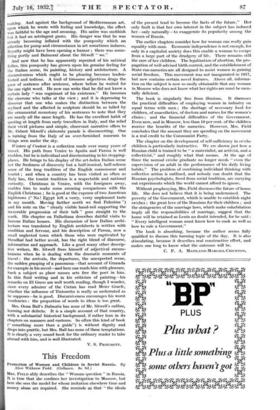This Freedom
Protection of Women and Children in Soviet Russia. By Alice Withrow Field. (Gollancz. as. 6d.)
MRS. FIELD ably describes the " Woman question " in Russia.
It is true that she confines her investigation to Moscow, but here she sees the model for whose imitation elsewhere time and money alone are required. She reminds us that "'the ideals of the present tend to become the facts of the future." Her only fault is that her own interest in the subject has induced her—only naturally—to exaggerate its popularity among the women of Russia.
The earlier chapters consider how far woman can really gain equality with man. Economic independence is not enough, for only in a capitalist society does this enable a woman to escape from a large part of the drudgery of life. There remains still the care of her children. The legalization. of abortion, the pro- pagation of well-advised birth control, and the establishment of State-run nurseries are all designed to assist women in gaining social freedom. This movement was not inaugurated in 1917, but now contains certain novel features. Above all, informa- tion on the subject is now so easily obtainable that any woman in Moscow who does not know what her rights are must be men- tally deficient.
The book is singularly free from illusions. It discusses the practical difficulties of employing women in industry on equal terms with men ; the shortage of necessary food for children, of anaesthetics, of doctors and nurses for the women's clinics ; and the financial difficulties of the Government. Even now, and in Moscow, less than 10 per cent. of the children receive the benefits of the nurseries. However, Mrs. Field concludes that the amount they are spending on the movement is a real credit to the Communist Party.
The chapter on the development of self-sufficiency in creche children is particularly instructive. We are shown just how a Russian child is trained to be " a materialist, an activist, and a collectivist," and roughly what that means. At the age of three the normal crèche graduate no longer needs " even the supervision of an adult in the performance of his daily living habits." The problem of combining individual thinking with collective action is outlined, and nobody can doubt that the Russian psychologists, freed from social tradition, are carrying out experiments which the world cannot afford to ignore.
Without prophesying, Mrs. Field discusses the future of home life. She does not believe that it is being undermined. The poverty of the Government, which is unable to establish night creches ; the great love of the Russians for their children ; and the stringencies of the marriage laws, which make cohabitation imply all the responsibilities of marriage, suggest that the home will be retained as Lenin no doubt intended, for he said : " Every intelligent woman must know how to cook as well as how to rule a Government."
The book is absorbing, because the author seems fully qualified to discuss this burning topic of the day. It is also stimulating, because it describes real constructive effort, and makes one long to know what the outcome will be.
C. F. A. MAITLAND-MAIWILL-CRICHTON.


































 Previous page
Previous page